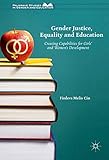Gender Justice, Education and Equality [electronic resource] : Creating Capabilities for Girls' and Women's Development / by Firdevs Melis Cin.
Material type: TextSeries: Palgrave Studies in Gender and EducationPublisher: Cham : Springer International Publishing : Imprint: Palgrave Macmillan, 2017Description: IX, 212 p. online resourceContent type: text Media type: computer Carrier type: online resourceISBN: 9783319391045Subject(s): Education | Educational sociology | Teaching | Gender identity in education | Sociology | Education and sociology | Sociology, Educational | Social justice | Human rights | Sex (Psychology) | Gender expression | Gender identity | Education | Gender and Education | Gender Studies | Teaching and Teacher Education | Sociology of Education | Sociology of Education | Social Justice, Equality and Human RightsAdditional physical formats: Printed edition:: No titleDDC classification: 370.81 LOC classification: LC212.9-LC212.93Online resources: e-book Full-text access
TextSeries: Palgrave Studies in Gender and EducationPublisher: Cham : Springer International Publishing : Imprint: Palgrave Macmillan, 2017Description: IX, 212 p. online resourceContent type: text Media type: computer Carrier type: online resourceISBN: 9783319391045Subject(s): Education | Educational sociology | Teaching | Gender identity in education | Sociology | Education and sociology | Sociology, Educational | Social justice | Human rights | Sex (Psychology) | Gender expression | Gender identity | Education | Gender and Education | Gender Studies | Teaching and Teacher Education | Sociology of Education | Sociology of Education | Social Justice, Equality and Human RightsAdditional physical formats: Printed edition:: No titleDDC classification: 370.81 LOC classification: LC212.9-LC212.93Online resources: e-book Full-text access | Item type | Current library | Collection | Call number | Copy number | Status | Notes | Date due | Barcode |
|---|---|---|---|---|---|---|---|---|
| E-Books | MEF eKitap Kütüphanesi | Springer Nature | LC212.9 -LC212.93 (Browse shelf (Opens below)) | Available | NATURE | 1420038-1001 |
PART I -- Chapter 1. Introduction: Conceptualising Gender Justice -- Chapter 2. Understanding(s) of Education, Gender Justice and Human Development -- PART II -- Chapter 3. Understanding Context: Political History, Gender Politics and Education Provision in Turkey -- Chapter 4. The Women and Their Micro-Contexts -- Chapter 5. Exploring Gender Inequalities in Personal Spaces and Private Sphere -- Chapter 6. Education and Changing Lives -- Chapter 7. Working for Social and Gender Justice -- PART III -- Chapter 8. Conclusion: A Capabilities-based Human Development Approach to Gender Justice and Education in Turkey.
This book reframes gender and education issues from a feminist and capabilities perspective through a multi-generational study of women as teachers. It explores how different understandings of gender, equality and education generate a variety of approaches with which to pursue gender equality in education. Through employing the capabilities approach in a critical and innovative way to question justice, agency and well-being and also to evaluate valued functionings and capabilities, freedoms and lack of opportunities in women's lives in Turkey it highlights the need for constructing a gender-just society. The book takes a closer look at these women's memories, in order to understand how gender roles were created, negotiated and contested, and how the transition to modern ways of socialising and existing was shaped and women's emancipation was guided by women teachers as social actors, rather than as passive onlookers or oppressed individuals. It provides important insights and critical evidence to be used in the planning and implementation of education and social/gender policies.
5
